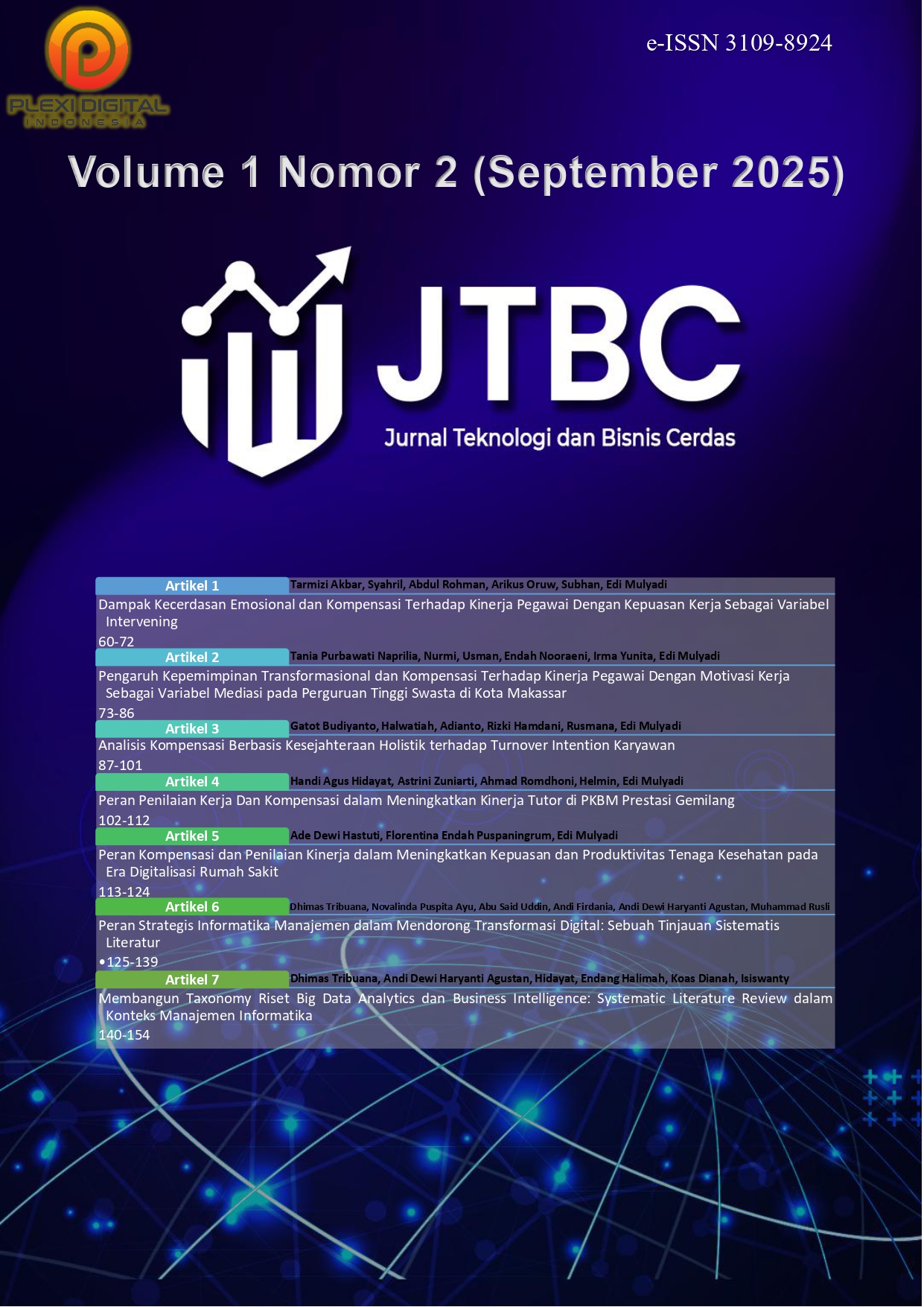Analisis Kompensasi Berbasis Kesejahteraan Holistik Terhadap Turnover Intention Karyawan
DOI:
https://doi.org/10.64476/jtbc.v1i2.8Kata Kunci:
kompensasi berbasis kesejahteraan, pekerjaan–keluarga, FSSB, fleksibilitas kerja, keadilan organisasi, EAP, pengakuan, niat keluar kerjaAbstrak
Studi ini meninjau secara sistematis (PRISMA 2020) bukti tentang kompensasi berbasis kesejahteraan holistik dan kaitannya dengan niat keluar. Penelusuran pada Scopus, ScienceDirect, Taylor & Francis Online, Google Scholar, dan SINTA mengidentifikasi publikasi 2018–2025 berbahasa Indonesia/Inggris, ditelaah sejawat, dan secara langsung menautkan komponen kompensasi fleksibilitas kerja, dukungan kerja–keluarga/FSSB, kompensasi & keadilan, dukungan kesehatan mental/EAP, pengakuan, serta kepemimpinan/sumber daya dengan niat keluar. Sebanyak 32 studi memenuhi kriteria (empat meta-analisis, tiga tinjauan sistematis, satu eksperimen lapangan acak, dan dua puluh empat studi kuantitatif). Sintesis tematik dan pendekatan SWiM menunjukkan 28/32 studi melaporkan penurunan niat keluar saat komponen kesejahteraan diterapkan; 3/32 mengindikasikan peningkatan terkait kekerasan psikologis, absensi, serta burnout/stres; 1/32 tidak signifikan langsung namun mengarah melalui kepuasan kerja. Mediator dominan mencakup kepuasan, keterlibatan, dan motivasi, sementara konflik kerja–keluarga serta burnout menurun. Temuan selaras dengan kerangka Job Demands–Resources: sumber daya kerja meningkatkan fungsi psikologis dan menekan tuntutan, sehingga niat keluar turun. Kami merekomendasikan Total Rewards Holistik memadukan fleksibilitas, FSSB/work–family, keadilan dan transparansi kompensasi, EAP/kesehatan mental, pengakuan, serta kepemimpinan suportif; riset mendatang perlu desain longitudinal/eksperimental, standardisasi indikator, dan evaluasi biaya–manfaat.
Unduhan
Referensi
Abdul Aziz, A. F., & Ong, T. (2025). Access to employee assistance programs and employee wellbeing: a cross-sectional study of employees in Southeast Asia. BMC Public Health, 25(1), 398. https://doi.org/10.1186/s12889-025-21358-7
Bakker, A. B., Demerouti, E., & Sanz-Vergel, A. (2023). Job Demands–Resources Theory: Ten Years Later. Annual Review of Organizational Psychology and Organizational Behavior, 10(1), 25–53. https://doi.org/10.1146/annurev-orgpsych-120920-053933
Bloom, N., Han, R., & Liang, J. (2024). Hybrid working from home improves retention without damaging performance. Nature, 630(8018), 920–925. https://doi.org/10.1038/s41586-024-07500-2
Burhanudin Burhanudin, Fajar Ardiansyah, & Ferri Kuswantoro. (2025). The Effects Of Compensation On Job Satisfaction And Turnover Intention. International Journal Of Humanities Education and Social Sciences (IJHESS), 4(6). https://doi.org/10.55227/ijhess.v4i6.1407
Chen, X., Al Mamun, A., Hussain, W. M. H. W., Jingzu, G., Yang, Q., & Shami, S. S. A. Al. (2023). Envisaging the job satisfaction and turnover intention among the young workforce: Evidence from an emerging economy. PLOS ONE, 18(6), e0287284. https://doi.org/10.1371/journal.pone.0287284
Çivilidağ, A., & Durmaz, Ş. (2024). Examining the relationship between flexible working arrangements and employee performance: a mini review. Frontiers in Psychology, 15. https://doi.org/10.3389/fpsyg.2024.1398309
Coudounaris, D. N., Akuffo, I. N., & Nkulenu, A. O. (2020). Human Resource Management for Ghanaian Nurses: Job Satisfaction Versus Turnover Intentions. Sustainability, 12(17), 7117. https://doi.org/10.3390/su12177117
Deci, E. L., & Ryan, R. M. (2000). The “What” and “Why” of Goal Pursuits: Human Needs and the Self-Determination of Behavior. Psychological Inquiry, 11(4), 227–268. https://doi.org/10.1207/S15327965PLI1104_01
Geisler, M., Berthelsen, H., & Muhonen, T. (2019). Retaining Social Workers: The Role of Quality of Work and Psychosocial Safety Climate for Work Engagement, Job Satisfaction, and Organizational Commitment. Human Service Organizations: Management, Leadership & Governance, 43(1), 1–15. https://doi.org/10.1080/23303131.2019.1569574
Guo, Y., Wang, S., Rofcanin, Y., & Heras, M. Las. (2024). A meta-analytic review of family supportive supervisor behaviors (FSSBs): Work-family related antecedents, outcomes, and a theory-driven comparison of two mediating mechanisms. Journal of Vocational Behavior, 151, 103988. https://doi.org/10.1016/j.jvb.2024.103988
Harrop, N., Jiang, L., & Overall, N. (2025). A Meta‐Analysis of Antecedents and Outcomes of Flexible Working Arrangements. Journal of Organizational Behavior. https://doi.org/10.1002/job.2896
Ingsih, K., Kadarningsih, A., & Rijati, N. (2022). Job Stress, Compensation, Job Dissatisfaction and Turnover Intention. https://doi.org/10.2991/aisr.k.220201.013
Jiang, L., Pan, Z., Luo, Y., Guo, Z., & Kou, D. (2023). More flexible and more innovative: the impact of flexible work arrangements on the innovation behavior of knowledge employees. Frontiers in Psychology, 14. https://doi.org/10.3389/fpsyg.2023.1053242
Jiang, L., Wider, W., Ye, G., Tee, M., Hye, A. K. M., Lee, A., & Tanucan, J. C. M. (2024). Exploring the factors of employee turnover intentions in private education institutions in China: a Delphi study. Cogent Business & Management, 11(1). https://doi.org/10.1080/23311975.2024.2413915
Jo, H., & Shin, D. (2025). The impact of recognition, fairness, and leadership on employee outcomes: A large-scale multi-group analysis. PLOS ONE, 20(1), e0312951. https://doi.org/10.1371/journal.pone.0312951
JobStreet by SEEK. (2023). Jobseekers’ Market Survey—SEA & Hong Kong. https://my.jobstreet.com/about/news/article/2023-jobseekers-market
JobStreet by SEEK. (2024). Hiring, Compensation & Benefits Report (Indonesia). https://id.jobstreet.com/about/news/article/hcb-report-2024
Jun, K., Hu, Z., & Sun, Y. (2023). Impact of authentic leadership on employee turnover intention: Perceived supervisor support as mediator and organizational identification as moderator. Frontiers in Psychology, 14. https://doi.org/10.3389/fpsyg.2023.1009639
Kim, H., & Kim, E. G. (2021). A meta‐analysis on predictors of turnover intention of hospital nurses in South Korea (2000–2020). Nursing Open, 8(5), 2406–2418. https://doi.org/10.1002/nop2.872
Kim, W., Han, S. J., & Park, J. (2019). Is the Role of Work Engagement Essential to Employee Performance or ‘Nice to Have’? Sustainability, 11(4), 1050. https://doi.org/10.3390/su11041050
Lazarus, R. S., & Folkman, S. (1984). Stress, Appraisal, and Coping. Springer.
Lee, C., & Kim, K. (2024). Analysis of Job Satisfaction and Turnover Intention According to the Characteristics of Forest Industry Workers. Forests, 15(11), 1899. https://doi.org/10.3390/f15111899
Luan, Y., Zhao, G., & Wang, N. (2025). Consequences of family-supportive supervisor behaviour: A meta-analytic review. South African Journal of Business Management, 56(1). https://doi.org/10.4102/sajbm.v56i1.4642
Luo, Y., Zhang, M., Yu, S., Guan, X., Zhong, T., Wu, Q., & Li, Y. (2024). The impact of psychological violence in the workplace on turnover intention of clinical nurses: the mediating role of job satisfaction. BMC Nursing, 23(1), 844. https://doi.org/10.1186/s12912-024-02477-9
Medina-Garrido, J. A., Biedma-Ferrer, J. M., & Rodríguez-Cornejo, M. V. (2021). I Quit! Effects of Work-Family Policies on the Turnover Intention. International Journal of Environmental Research and Public Health, 18(4), 1893. https://doi.org/10.3390/ijerph18041893
Mengstie, M. M. (2020). Perceived organizational justice and turnover intention among hospital healthcare workers. BMC Psychology, 8(1), 19. https://doi.org/10.1186/s40359-020-0387-8
Moon, K.-K., Lim, J., & Kim, J.-S. (2024). Examining the Effect of Organizational Justice on Turnover Intention and the Moderating Role of Generational Differences: Evidence from Korean Public Employees. Sustainability, 16(6), 2454. https://doi.org/10.3390/su16062454
Ndiango, S., Gabriel, D., & Changalima, I. A. (2024). Give me my flowers before I die! Linking employee recognition, job satisfaction and employee retention in logistics companies: A multigroup analysis. Social Sciences & Humanities Open, 10, 101053. https://doi.org/10.1016/j.ssaho.2024.101053
Otoo, F. N. K. (2024). Does employee engagement mediate the nexus of job resource and employee turnover intentions? IIMT Journal of Management, 1(2), 130–170. https://doi.org/10.1108/IIMTJM-10-2023-0032
Pacutova, V., Madarasova Geckova, A., Kizek, P., F. de Winter, A., & A. Reijneveld, S. (2021). The Impact of Pandemic Management on the Quality of Life of Slovak Dentists. International Journal of Environmental Research and Public Health, 18(10), 5484. https://doi.org/10.3390/ijerph18105484
Ramlah, S., Sudiro, A., & Juwita, H. A. J. (2021). The influence of compensation and job stress on turnover intention through mediation of job satisfaction. International Journal of Research in Business and Social Science (2147- 4478), 10(4), 117–127. https://doi.org/10.20525/ijrbs.v10i4.1206
Saputra, I. W. A., & Suwandana, I. G. M. (2021). Employee Engagement and Compensation on Employee Turnover Intention at a Local Café and Bar in Bali, Indonesia. European Journal of Business and Management Research, 7(1), 329–332. https://doi.org/10.24018/ejbmr.2022.7.1.1237
Sinisterra, L., Peñalver, J., & Salanova, M. (2024). Connecting the organizational incomes and outcomes: a systematic review of the relationship between talent management, employee engagement, and turnover intention. Frontiers in Psychology, 15. https://doi.org/10.3389/fpsyg.2024.1439127
Susanti, F. D., & Rizal, A. (2022). The Effect of Compensation, Organizational Culture and Work Motivation on Turnover Intention. Indonesian Journal of Law and Economics Review, 17. https://doi.org/10.21070/ijler.v17i0.816
Tett, R. P., & Meyer, J. P. (1993). Job satisfaction, organizational commitment, turnover intention, and turnover: Path analyses based on meta-analytic findings. Personnel Psychology, 46(2), 259–293.
World Health Organization. (2022). Guidelines on mental health at work. https://www.who.int/publications/i/item/9789240053052
World Health Organization, & International Labour Organization. (2022). Mental health at work: Policy brief. https://www.who.int/publications/i/item/9789240057944
Yaqin, A. A., & Indradewa, R. (2025). The Effect of Compensation, Workload, and Work Life Balance on Turnover Intention. Jurnal Ilmiah Manajemen Kesatuan, 13(4), 2279–2292. https://doi.org/10.37641/jimkes.v13i4.3437
Yücel, İ. (2021). Transformational Leadership and Turnover Intentions: The Mediating Role of Employee Performance during the COVID-19 Pandemic. Administrative Sciences, 11(3), 81. https://doi.org/10.3390/admsci11030081
Zhao, S., Ma, Z., Li, H., Wang, Z., Wang, Y., & Ma, H. (2024). The Impact of Organizational Justice on Turnover Intention Among Primary Healthcare Workers: The Mediating Role of Work Motivation. Risk Management and Healthcare Policy, Volume 17, 3017–3028. https://doi.org/10.2147/RMHP.S486535
Zhou, H., & Ma, J. (2022). Organizational Justice and Teachers’ Turnover Intention in Primary and Secondary Schools: The Importance of Sustainable Salary Management. Sustainability, 14(20), 13314. https://doi.org/10.3390/su142013314
Unduhan
Diterbitkan
Cara Mengutip
Terbitan
Bagian
Lisensi
Hak Cipta (c) 2025 Gatot Budiyanto, Halwatiah, Adianto, Rizki Hamdani, Rusmana, Edi Mulyadi

Artikel ini berlisensi Creative Commons Attribution 4.0 International License.
Artikel ini diterbitkan di bawah Lisensi Creative Commons Attribution 4.0 International (CC BY 4.0).
Anda bebas menggunakan, membagikan, dan mengadaptasi karya ini selama mencantumkan atribusi yang sesuai kepada penulis dan sumber asli publikasi.
info:eu-repo/semantics/openAccess
https://creativecommons.org/licenses/by/4.0/

















